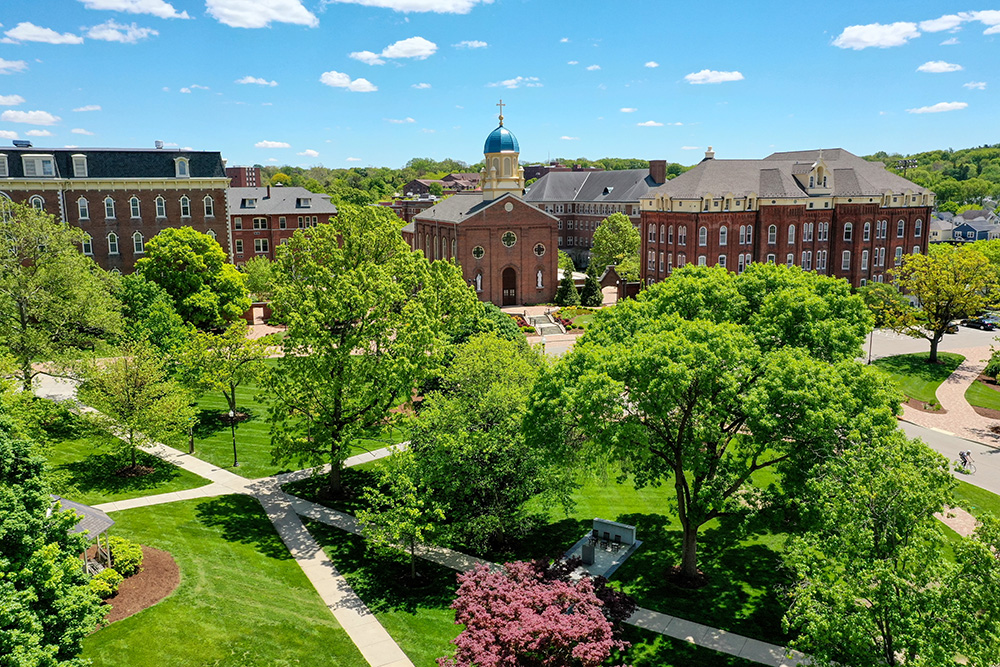Dayton Docket

Law Students Explore Innovative Solutions To Human Rights Issues
Each week the 11 students filed into a small classroom inside Keller Hall ready to not just talk about the world’s problems but to solve them.
They were part of a class on International Human Rights Law taught by Inter-American Human Rights Commissioner and University of Dayton School of Law Professor Carlos Bernal.
And while studying issues that have vexed leaders, scholars and activists for hundreds of years might seem intimidating to some, these students approached the task with an attitude of discovery.
“It’s daunting, but if you love it and want to get into it, it’s very rewarding,” says Clayton Marsh, who took the class before graduating from Dayton Law in May.
Class discussions were largely student-led. Each student was assigned a chapter of the text to present to their classmates along with a counter viewpoint to that chapter.
“I loved doing it,” says Melissa Mazer, who graduated in May after taking the class. “You could see everyone in class genuinely cared about these issues. It was helpful hearing different perspectives and working through the problems together.”
Conversations revolved around human rights, ranging from the philosophy behind them to the laws governing them, with a focus on searching for answers to real-world issues.
“Identifying the problem is the first step, but then how do you address it,” says rising 3L Andreya Carlson. “We were encouraged to come with solutions and I enjoyed that.”
As part of the class, students had to write papers explaining an issue and its possible remedies. Topics ranged from improving the United Nations Human Rights Council to addressing the issue of child soldiers in international criminal law.
Mazer and Deztany Johnson, who also graduated in May, wrote their paper on the topic, “COVID Lighting the Way: Leveraging Pandemic Pitfalls to Remedy Human Trafficking Concerns in South Asia Through Pakistan’s International Compliance.”
“There are so many issues and ways of approaching them, so the challenge is how do you get all the pieces to line up to take care of people,” Mazer says. “It was really cool seeing how we both approached the problem to come up with a piece that reflected what we were trying to get across.”
Helping students as they tried to find solutions was Professor Bernal, who was able to use his experience as an Inter-American Human Rights Commissioner and former Colombian Constitutional Court justice to inform their efforts.
“Legal education should train students to solve real problems and not only to know the law and apply it to cases,” says Professor Bernal. “Education should have a tangible impact in society. Students have a fresh perspective. They can use it to craft new ideas and innovative solutions to social and legal matters.”
Students say Professor Bernal was a big reason why they were interested in taking the class and why they gained so much from it.
“I enjoy his teaching style,” says rising 3L JP Jarecki. “I appreciate how he’s interested in moving students forward regardless of where they are. If you have a written work product, even if it’s good, he wants it to be that little bit better.”
Jarecki and Carlson did their paper on the topic, “The Trouble with Tech: Impacts of Information and Communication Technologies on the International Child Sex Tourism Infrastructure.”
“Technology is making the world smaller, but it’s enabling people who are perpetrating these actions to more easily communicate and plan them,” Jarecki says.
Adds Carlson, “This kind of crime is always going to be a challenge. Law enforcement doesn’t always have the capabilities to utilize certain cutting edge technologies or have the training to detect these crimes.”
Carlson says she went to law school in part because of her passion around addressing international human rights issues, so for her it was great to get the opportunity to do just that in this class.
“I felt like we were able to delve into deep discussions of law and policy,” Carlson says. “The class was very collaborative.”
Maxwell Newsome, who took the class before graduating in May, also liked the ability to interact with fellow classmates and work on the paper with a partner.
“When you’re a lawyer you’ll be doing things with other associates at times, so that part was nice,” Newsome says.
Newsome and Marsh did their paper on the topic, “Rights, Margins, and Refugees: The Problems, Theories, and Solutions Governing Conflicts of Law within the Application of International Human Rights Law upon Domestic Law and the National Judicial Systems.”
“It’s easy as legal scholars to talk about whether asylum rights apply, but it impacts real people,” Marsh says. “This isn’t theoretical.”
Marsh says in writing the paper, the two found how difficult a solution to the problem can be.
“We were proud of how far we came and excited about being able to write on this topic,” Marsh says. “It was a stimulating topic to discover. The one thing daunting about it is that while we did write a lot, there’s still so much we could have talked about. We barley scraped the surface.”
Some may look at turning their papers into law review articles in an effort to get their research and potential solutions in front of a wider audience.
Students also feel like they left the class with a much better understanding of the future challenges facing the world when it comes to human rights.
“International human rights is a complicated topic, but it’s one that matters a lot,” says Newsome. “It’s going to be important for our generation of lawyers as everything becomes more globalized.”
Professor Bernal says this is one of the most exciting classes he has ever taught.
“Students engaged in deep deliberations every week, undertook additional research, participated in collective creation of knowledge, and, in the meantime, learned the class material,” Professor Bernal says. “They even came with ideas that I will try to implement at the Inter-American Human Rights Commission.”
